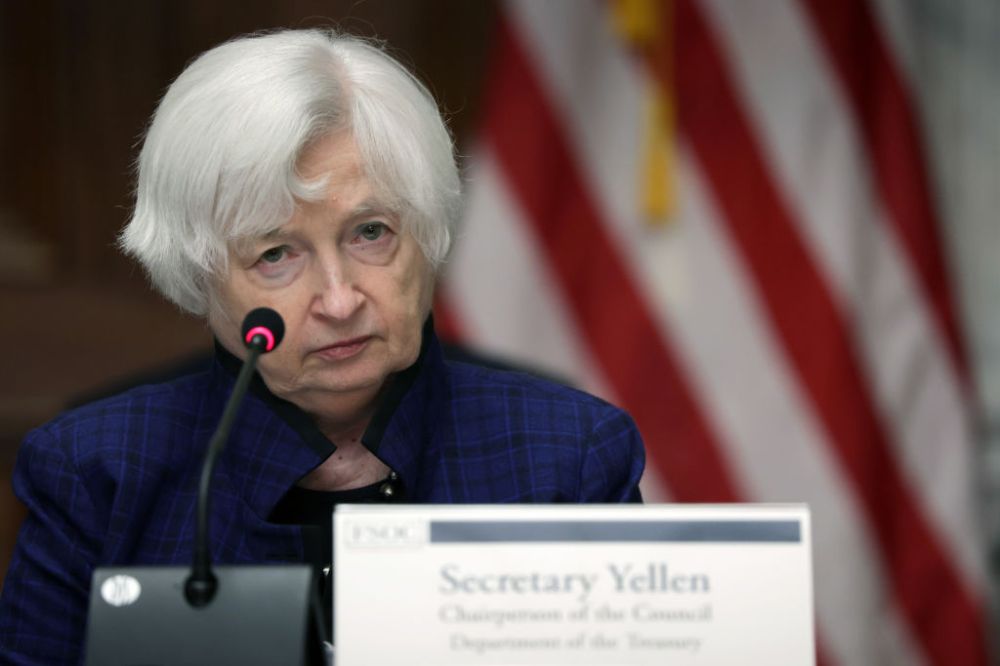Lawmakers may have just a month to raise the debt ceiling, with an economic crisis looming if they don’t. But after Treasury Secretary Janet Yellen warned of a potential June 1 deadline on Monday night, members of Congress and President Joe Biden didn’t move any further from their entrenched negotiating stances, raising questions about how quickly they can reach a deal.
June 1 feels even sooner in congressional time: The House and Senate are in session only about a dozen days each over the month of May.
“It is imperative that Congress act as soon as possible to increase or suspend the debt limit in a way that provides longer-term certainty that the government will continue to make its payments,” Yellen wrote in a letter to congressional leaders.
There isn’t likely to be much movement on the issue this week. The House is out, with House Speaker Kevin McCarthy traveling abroad. The Senate, meanwhile, is poised to trade political barbs—and not much substantive negotiation—in a committee hearing Thursday about the Republican debt limit plan that passed the House last week.
The real news may come next Tuesday, May 9. That’s the day Biden has invited the top four congressional leaders to meet to discuss the debt limit. It will mark his first meeting with McCarthy on the matter since February, but Biden’s team is signaling he hasn’t shifted his stance on the matter since then. A White House official told CNN the president “will stress that Congress must take action to avoid default without conditions.”
Senate Democrats, too, doubled down on their refusal to grant Republicans policy concessions as part of the debt limit debate. Senate Majority Whip Dick Durbin told The Dispatch there will be give-and-take “at some point, but we can’t have this suicide pact where we’re going to walk in the room and risk the entire economy cratering.”
Running too close to the deadline could spook markets and do tangible economic harm. Full-blown default on America’s debts, on the other hand, would be historic and likely catastrophic.
“We always have conversations about budgets and appropriations and revenue,” Durbin said, arguing Republicans should save their demands for spending talks, not tie them to the debt ceiling.
House Republicans, with few leverage opportunities to make their priorities law in a divided government, have pledged not to support the “clean” debt ceiling increase Biden wants. They’ve pushed to tie action on the debt limit to government spending cuts, boosts in domestic oil and gas drilling, and expanded work requirements for social safety net programs, among other priorities. The bill that passed the House last week would limit federal spending and raise the nation’s borrowing cap by $1.5 trillion or until March 2024, whichever comes first. But it has no chance of passing the Democratic-controlled Senate.
Democrats, meanwhile, appear to believe Yellen’s estimated June 1 deadline improves their leverage. “It’s time to put aside partisan interests and do what is right and necessary for the American people,” Senate Majority Leader Chuck Schumer and House Minority Leader Hakeem Jeffries said in a statement shortly after Yellen’s letter became public Monday.
In his own statement, McCarthy slammed Biden for not negotiating with Republicans over the past three months. “The Senate and the president need to get to work—and soon,” he said, referring to consideration of the House’s bill.
After Yellen’s letter Monday, experts predicted the compressed timeline increases the odds of a short-term debt limit hike. There’s recent precedent for it: In September 2017, lawmakers suspended the debt ceiling for three months. Such a move might push back the debt ceiling deadline to match a separate cutoff on government spending talks for the upcoming fiscal year. Republicans may be open to the idea because it would keep their negotiating power intact.
Virginia Democratic Sen. Tim Kaine, though, rejected the prospect. “That’s still playing leverage with the full faith and credit of the United States,” he told reporters of a short-term deal. “It’s not that the two sides have a position. One is to honor America’s debt, one is not.”
Senate Republicans largely stood behind McCarthy Monday night, aiming to strengthen his negotiating position. “It’s not going to be a clean debt ceiling increase,” said Texas Sen. John Cornyn. He added that senators should get out of the way “and just let Biden and McCarthy cut a deal.”
Cornyn also raised questions about Yellen’s estimated deadline. “The problem is they’re the ones that control that, and they can say, ‘Well, it’s this date or this date,’” he said.
Yellen’s estimate is based on tax receipts, although the situation is fluid. She cautioned that the true “X date” could come a matter of weeks later than June 1. The Congressional Budget Office, too, wrote on Monday that tax payments processed in April “were less than we anticipated,” bolstering an early June projection for the debt ceiling deadline.
Does Yellen’s latest deadline add any urgency for Senate Republicans to reach a deal?
“No,” said Cornyn. “There’s still plenty of time.”
On the Floor
The House is out this week. The Senate is considering judicial nominees.
Key Hearings
- The Senate Judiciary Committee is meeting this morning for a hearing on Supreme Court ethics. Information and video here.
- Three military officials are testifying before a Senate panel this morning on the Defense Department’s space activities. Information and video here.
- A Senate Judiciary subcommittee will meet Wednesday afternoon to examine competition in digital advertising. Information and livestream here.
- Senators on the Foreign Relations Committee will hold a hearing Wednesday afternoon about global information wars. Information and livestream here.
- Director of National Intelligence Avril Haines and Defense Intelligence Agency Director Scott Berrier will testify on worldwide threats during a Thursday morning Senate Armed Services Committee hearing. Information and livestream here.
- The Senate Budget Committee will hold a hearing Thursday morning on the House GOP debt ceiling bill. Information and livestream here.
- The Senate committee that deals with health policy will debate pandemic preparedness legislation during a hearing Thursday afternoon. Information and livestream here.






Please note that we at The Dispatch hold ourselves, our work, and our commenters to a higher standard than other places on the internet. We welcome comments that foster genuine debate or discussion—including comments critical of us or our work—but responses that include ad hominem attacks on fellow Dispatch members or are intended to stoke fear and anger may be moderated.
With your membership, you only have the ability to comment on The Morning Dispatch articles. Consider upgrading to join the conversation everywhere.